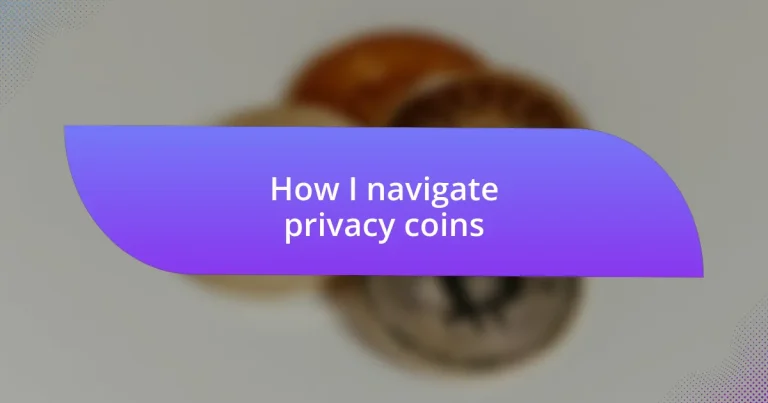Key takeaways:
- Privacy coins, like Monero and Zcash, use advanced cryptographic techniques to enhance user anonymity in transactions.
- Choosing the right privacy coin involves researching technology, community support, market reputation, and personal privacy values.
- Setting up a privacy wallet requires secure backups and understanding wallet features to ensure safety and usability.
- Regulatory considerations are crucial as they can significantly impact the use of privacy coins and require users to stay informed about local laws.
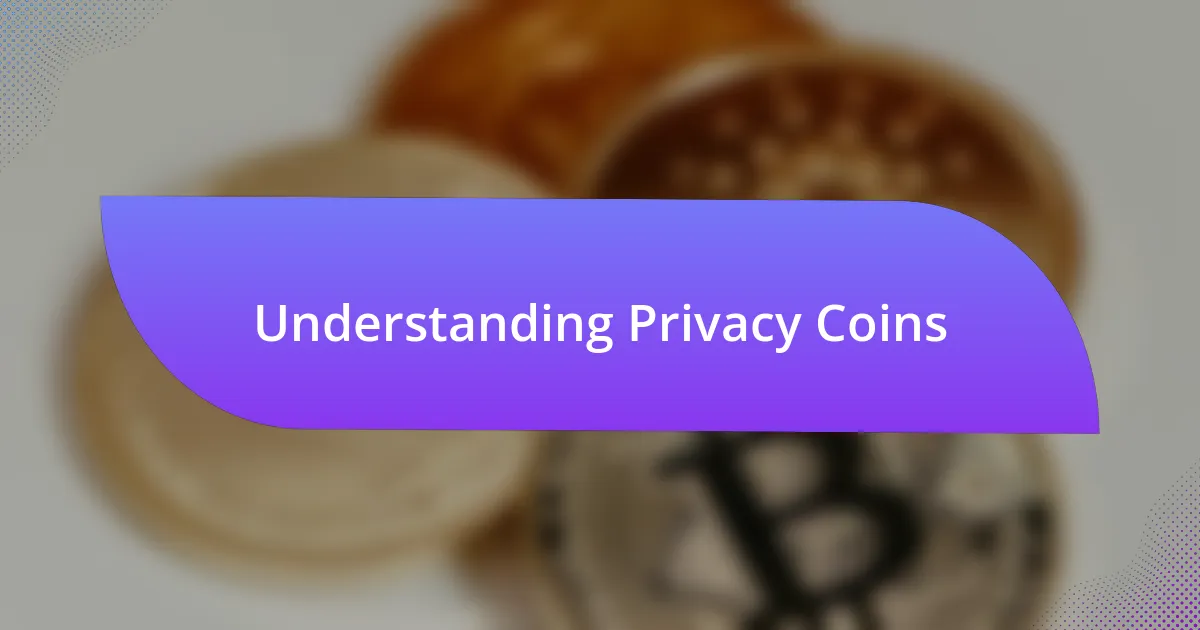
Understanding Privacy Coins
Privacy coins are a fascinating aspect of the cryptocurrency world, designed to provide users with a higher degree of anonymity than traditional cryptocurrencies like Bitcoin. I remember my first encounter with privacy coins; it was eye-opening to see how they can obscure transaction details from prying eyes. Have you ever felt uneasy about your financial data being potentially exposed? I certainly have, and that’s what drew me into exploring these coins further.
At their core, privacy coins utilize advanced cryptographic techniques to ensure that transaction origins, amounts, and destinations remain confidential. For example, coins like Monero and Zcash employ technologies like ring signatures and zero-knowledge proofs. These methods are not just technical jargon; they represent a movement towards financial autonomy and protection in our increasingly surveilled digital landscape.
Navigating the landscape of privacy coins can be overwhelming, especially with the constant evolution of technology and regulations. I often find myself questioning the balance between privacy and legality. This makes it imperative for users to stay informed and make conscious choices about their engagement with these digital assets. Ultimately, understanding privacy coins goes beyond just technical features; it’s about recognizing their role in maintaining personal freedom in financial transactions.
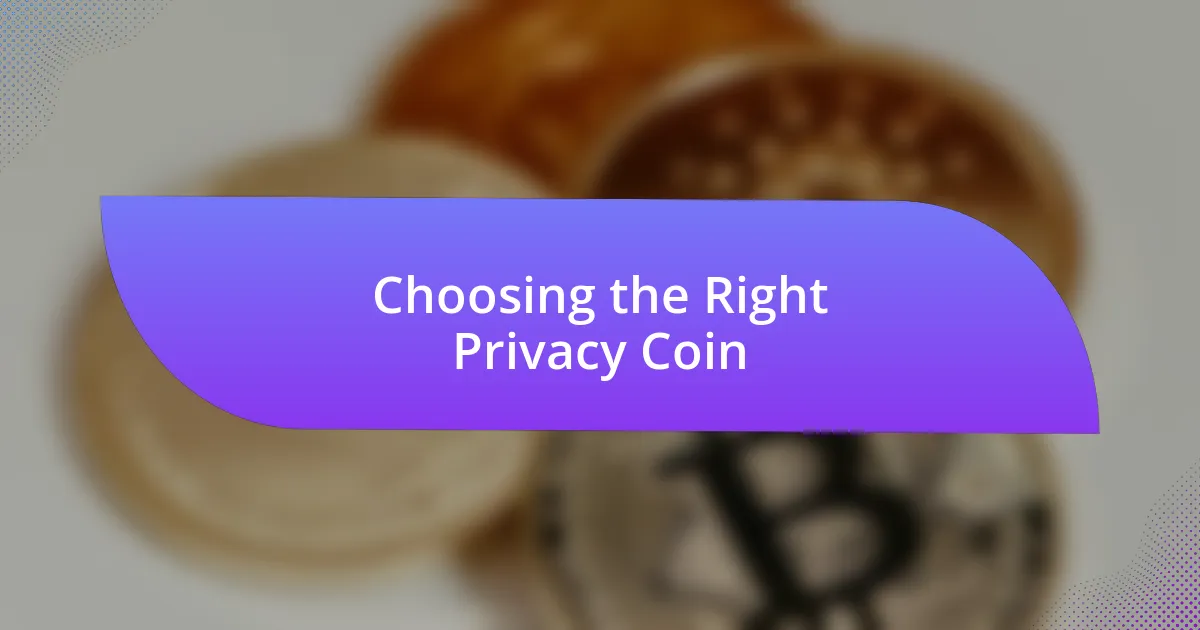
Choosing the Right Privacy Coin
Choosing the right privacy coin is a crucial decision that can greatly influence your experience in the cryptocurrency space. When I first started exploring these coins, I felt overwhelmed by the myriad of choices. It’s essential to consider factors like the technology behind the coin, its community support, and how well it addresses the privacy concerns that matter most to you. I realized that allocating time to research these elements can help you find a coin that aligns with your personal values and needs.
Here’s a quick guide to help you choose wisely:
- Research the Technology: Understand the mechanisms that provide privacy, such as stealth addresses or ring signatures.
- Community Engagement: Look into the active community around the coin; robust support often translates to better development and security.
- Market Reputation: Check how the coin has performed over time and its acceptance in exchanges.
- Regulatory Compliance: Consider the legal landscape surrounding the coin, as regulations can vary by region and may impact usability.
- Personal Values: Reflect on what privacy means to you – is it complete anonymity, or do you just want to limit data exposure?
Ultimately, this carefully considered approach ensures that the coin you select is not just a random choice but resonates with your beliefs and financial goals.
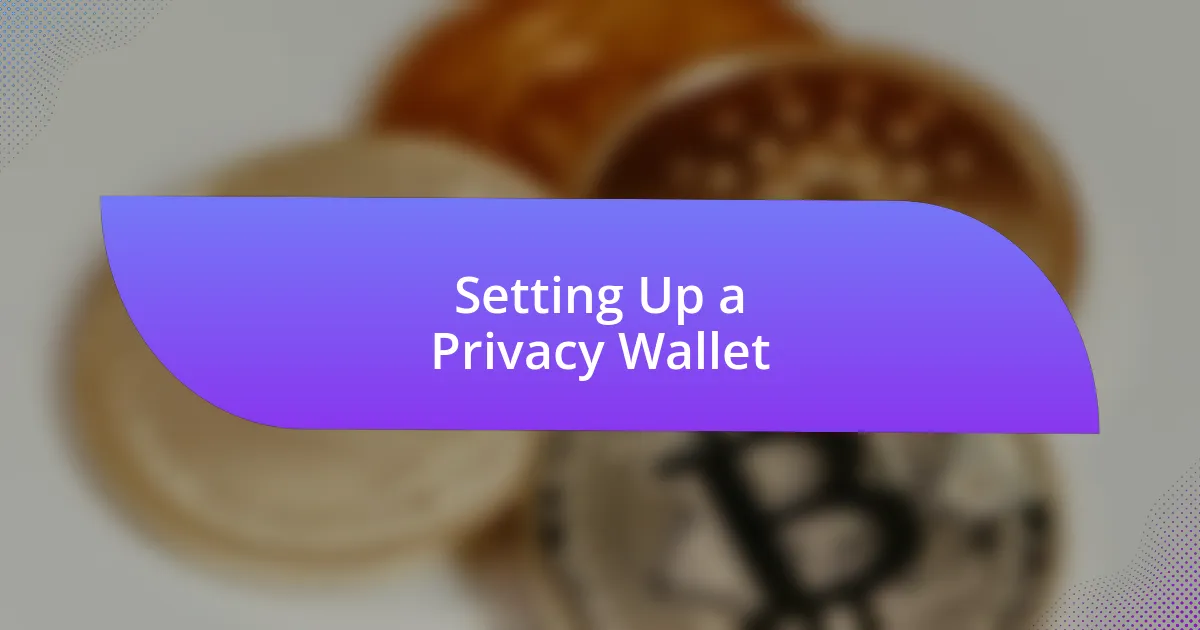
Setting Up a Privacy Wallet
Setting up a privacy wallet can seem daunting at first, but I’ve found that the right approach makes all the difference. Initially, I was hesitant due to concerns about security and usability, but once I chose the right wallet, my anxiety diminished significantly. Start by researching wallets that support the specific privacy coin you plan to use, as different wallets offer different features that cater to their unique privacy mechanisms.
One important aspect I learned is the necessity of a secure backup. When I first established my wallet, I made the mistake of not keeping a backup of my private keys. Losing access can be frustrating, especially with valuable data at stake. To protect yourself, ensure that you store backups in multiple secure locations and follow any wallet-specific guidelines on recovery to safeguard your assets.
As I ventured deeper into the world of privacy coins, I discovered that many wallets come with user-friendly interfaces that streamline the setup process. Features like two-factor authentication greatly enhance security, preventing unauthorized access. Taking the time to understand these options can simplify your experience and help avoid potential pitfalls along the way.
| Wallet Name | Privacy Features |
|---|---|
| Monero GUI Wallet | Stealth addresses, Ring signatures |
| ZecWallet | Shielded transactions, Address reuse protection |
| Wasabi Wallet | CoinJoin implementation, Tor integration |
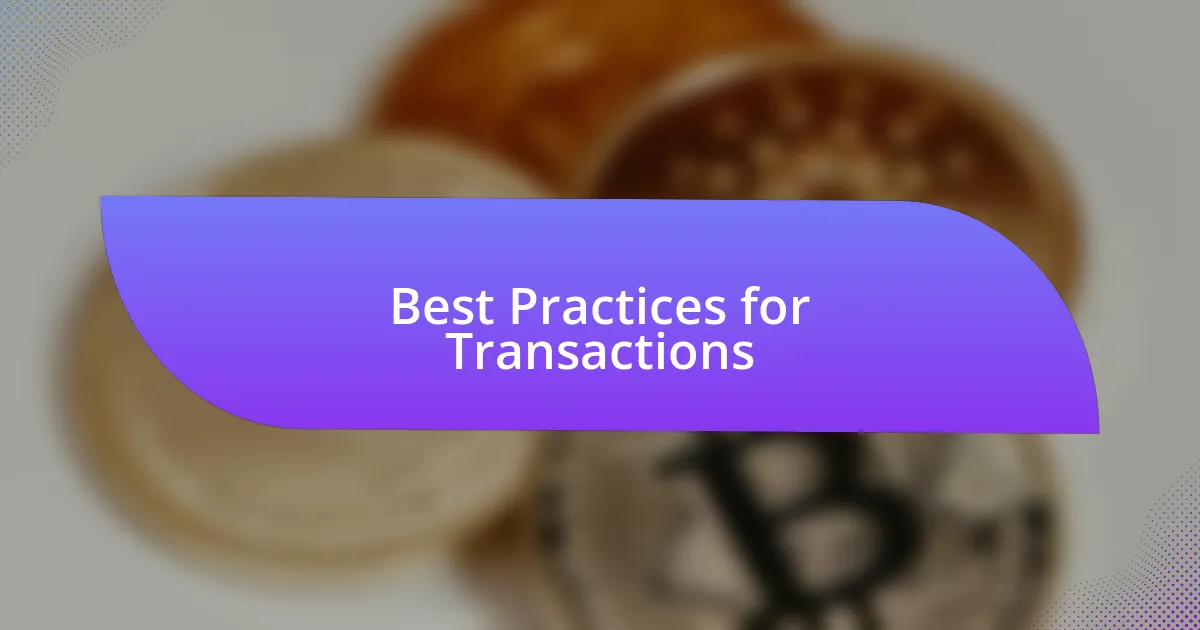
Best Practices for Transactions
When I first started making transactions with privacy coins, I quickly realized that discretion is key. I always ensure that I use a VPN to encrypt my internet connection, which helps shield my IP address from prying eyes. It’s a small step that significantly enhances my anonymity and gives me peace of mind.
Another thing I learned is the importance of using fresh addresses for each transaction. It might feel tedious, but I’ve found that generating new addresses for every payment can greatly reduce the ability to trace my financial activities. After I started doing this, I felt a renewed sense of control over my financial privacy.
Lastly, I can’t stress enough the necessity of keeping transaction amounts low to avoid drawing attention. At first, it felt restrictive, but I’ve come to appreciate the strategy. It’s not just about security; it’s about adopting a mindset that prioritizes privacy in every aspect of my transactions. Have you considered how minor adjustments can lead to safer transactions? I can confidently say that they make a big difference.
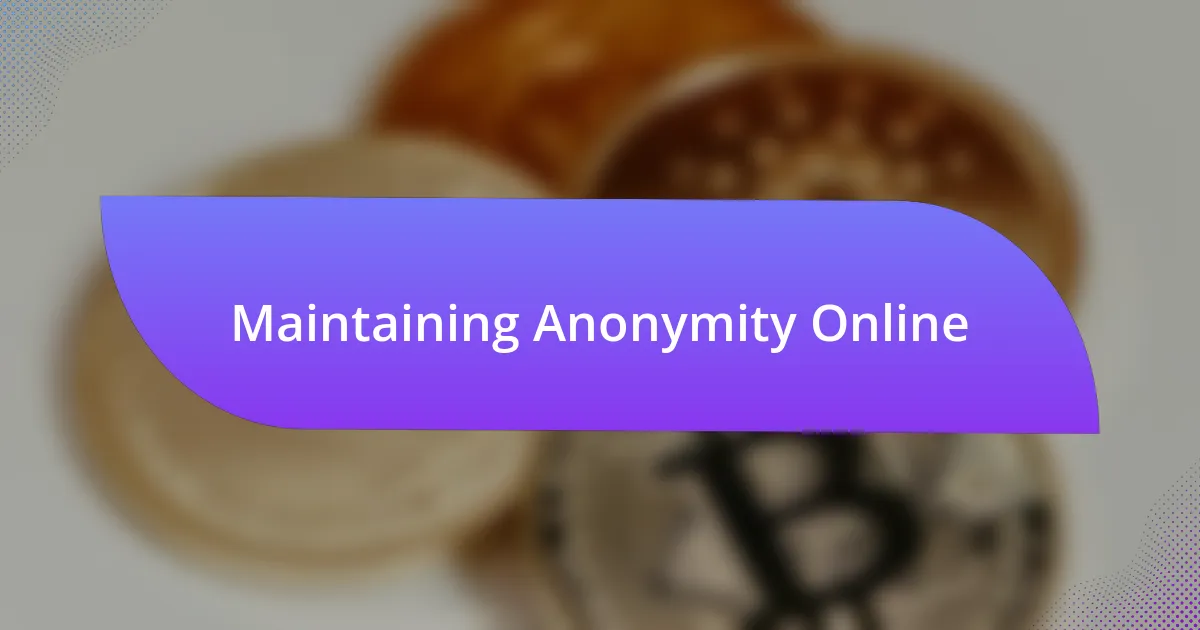
Maintaining Anonymity Online
Maintaining anonymity online is more than just a checklist—it’s a mindset. I vividly recall the first time I used a privacy-focused browser; it felt like I had unlocked a secret door to a realm where my online footprints were my own. But I learned quickly that simply using the browser wasn’t enough. Are you aware of how much data you leave behind with every click? It’s astonishing when you start delving into it, which is why I always disable cookies and use search engines that don’t track user data.
Another essential aspect of maintaining anonymity involves protecting your personal information on social media. I remember posting a seemingly harmless photo with location tags, only to realize later how vulnerable I made myself. That moment shifted my approach entirely. I now think twice before sharing and make sure to use privacy settings to restrict who can view my information. It’s a game-changer—hasn’t it made you rethink what you share online?
Lastly, utilizing encrypted messaging apps has become a cornerstone of my online communication. Early on, I was skeptical; I wondered if the extra steps were necessary. But after experiencing the peace of mind that comes with knowing my conversations are secure, I wouldn’t go back. Isn’t it incredible how a little extra caution can empower you in such a vulnerable space? These choices may seem small, but collectively, they forge a much stronger shield of privacy.
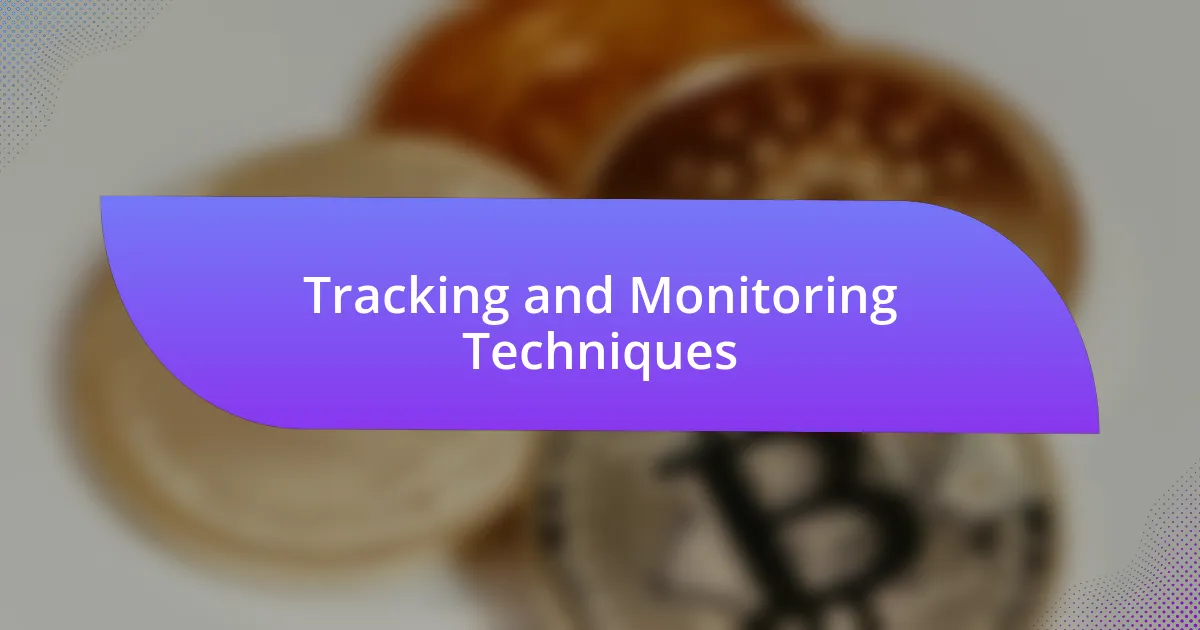
Tracking and Monitoring Techniques
Tracking and monitoring techniques have become increasingly sophisticated, which is particularly concerning for those of us invested in privacy coins. I recall the first time I discovered how easily blockchains can be analyzed. It was eye-opening to learn that even the seemingly anonymous transactions can leave clues, allowing analysts to trace back to the originating wallet. Have you ever thought about how your usage patterns might reveal more than you intend?
I’ve also noticed that some exchanges employ rigorous KYC (Know Your Customer) processes, which can counteract the privacy that coins provide. When I first encountered this, I was frustrated—here I was trying to maintain anonymity, yet the exchange was requesting my identification. It made me realize that the choice of where to make transactions directly impacts my privacy. If you’re considering using privacy coins, how do you choose which platforms align with your goals?
Lastly, it’s crucial to understand how metadata might inadvertently compromise your privacy. I once neglected to consider the digital traces left by my VPN connection. It was a startling realization when I learned how easily my activity could be aggregated and analyzed through time-stamped logs. Do you ever wonder what other unnoticed digital footprints you might be leaving? Becoming aware of these subtleties can significantly influence your navigation through the world of privacy coins.
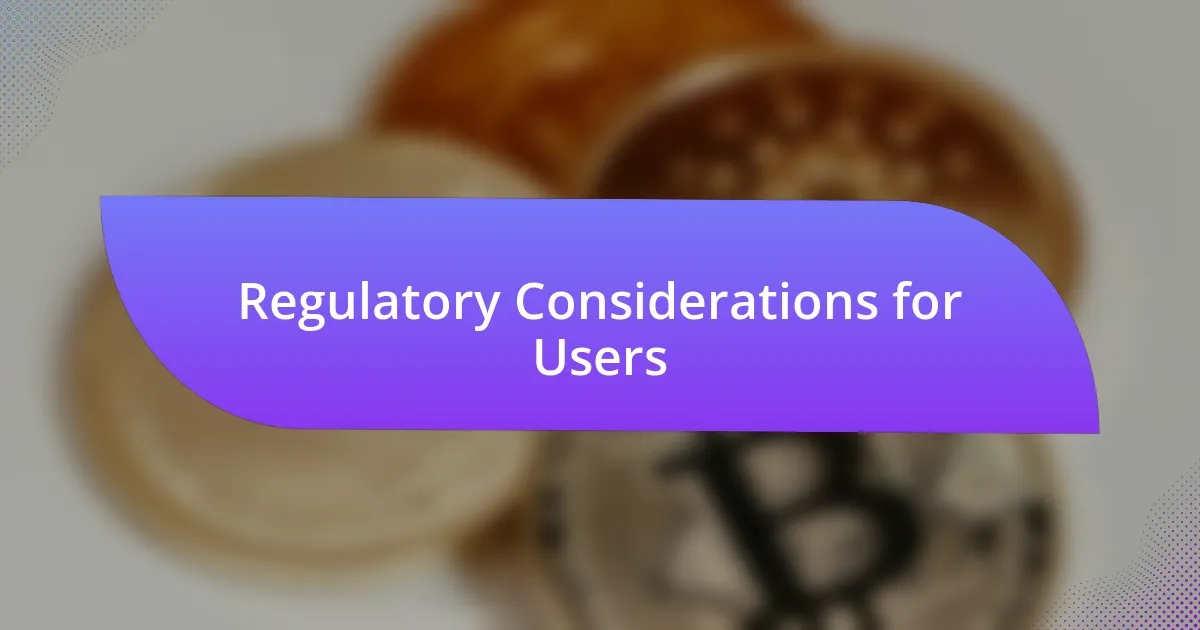
Regulatory Considerations for Users
Navigating the regulatory landscape for privacy coins can often feel daunting. I remember the uncertainty I felt when I first learned about varying laws across jurisdictions. It struck me that complying with regulations could mean sacrificing some of the very anonymity that attracted me to these coins in the first place. Have you ever found yourself asking how much transparency you are willing to give up for the sake of compliance?
The actions of regulators worldwide can significantly impact how I use privacy coins. I was taken aback when a country I had viewed as a safe haven for crypto tightened its regulations unexpectedly. This shift made me rethink my strategies. When considering your own approach, how often do you evaluate changes in local laws? Staying informed is not just a recommendation; it’s essential to navigating the ever-evolving landscape of privacy finance.
Moreover, I often ponder about the potential legal repercussions that might arise from using privacy coins. The idea of enjoying financial privacy can quickly diminish when faced with the possibility of legal challenges. This awareness influences my choices significantly. Are you prepared for the ramifications of your privacy decisions? Balancing the allure of anonymity against compliance requirements is a constant mental exercise for me, and I encourage everyone to consider their own position carefully.













